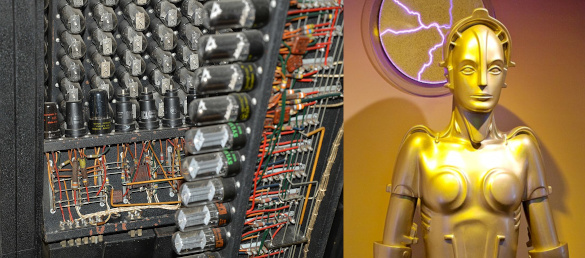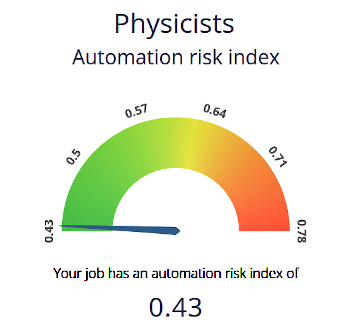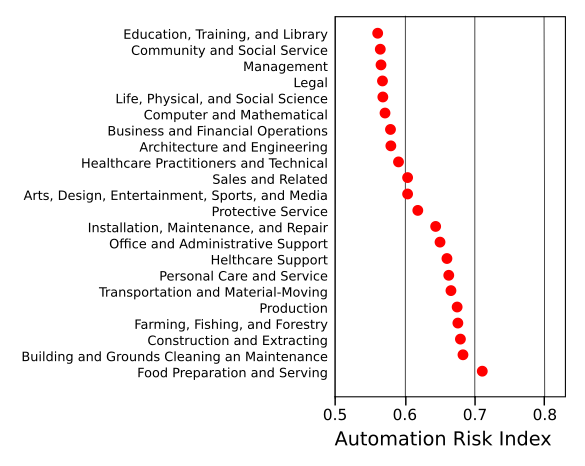Robot-Safe Jobs
June 13, 2022
I remember a
cartoon published in the early days of
ubiquitous computing in the late
1970s. A
business manager is telling one of his
employees that he
lost his job. The
tagline was, "...And the
funny thing is, the
computer that's replacing you is smaller than the head of a
pin." At that time, employee fears of job loss to
automation had been happening for at least twenty-five years. This fear was the
subject of the 1957
film,
Desk Set, starring
Spencer Tracy and
Katharine Hepburn.[1]
As I wrote in a
previous article (ENIAC at 75, June 7, 2021),
employees in the film resisted installation of a
mainframe computer, EMERAC, an
acronym for
Electromagnetic Memory and
Research Arithmetical Calculator. The EMERAC name was obviously chosen to evoke memories of
ENIAC, the first
programmable,
electronic, general-purpose
digital computer. EMERAC's functionality was quite
fictional. It could do
natural language processing, and it had a
database that's equivalent to the
Internet of today. In the end, it was revealed that the computer was there to assist the employees, not to replace them.

"Your face looks lovely in the warm glow of the ENIAC vacuum tubes." After upgrades in 1956, ENIAC contained 18,000 vacuum tubes, each with a glowing filament, although some had a metal envelope that blocked the light. (left, a photograph by Bubba73 of a portion of an ENIAC computer on display at Fort Sill Museum, Lawton, Oklahoma. Right, a photograph by Jiuguang Wang of a replica of the character, Maria from Metropolis, at the Robot Hall of Fame. Both images from Wikimedia Commons. Click for larger image.)
Such
fears pale in comparison to the
idea of a computer's taking control of the world, the
plot of the 1970 film,
Colossus: The Forbin Project.[2] As
technology has advanced, so have our fear of computers, with the present threat being the
technological singularity, the
future time at which
artificially intelligent systems will surpass the
capability of humans and
self-propagate. At that time,
humans will become
irrelevant; or, as in the example of the
Terminator films, something to be rendered
extinct.
The technological singularity will not happen in my
lifetime; and, humans are prone to short-term
thinking (e.g.,
global warming). Today's specific fear of computers is the same as it has been for half a
century; namely, job loss through automation. Just as the
buggy-whip manufacturers of an earlier era needed to
diversify in response to the advance of technology in the
invention of the
automobile, many people are looking to enter
careers that are protected from automation. A recent article in
Science Robotics investigates the
probability that a chosen career is
robust against automation.[3-4] The
authors refer to the more robust of these as
robot-safe.
This
blog is a
labor of love, and not a source of
income. That's fortunate, since a reasonably intelligent agent can compose readable versions of these blog articles using material from the
references. In fact, given a
topic, the agent can discover its own references. Those articles would lack the interesting
anecdotes from my long career in
science, but all the important
information would be there. Blog authorship is not
robot-safe. AI-written
sports and
business stories have appeared for many years, proving that
journalism jobs are not
robot-safe.
Roboticists from
École Polytechnique Fédérale de Lausanne (EPFL) and
economists from the
University of Lausanne collaborated on this study.[4] They examined robotic abilities from the
scientific and technical literature, compared these to
employment and
wage statistics, and developed a method to
calculate how existing jobs are vulnerable to being performed by
machines in the near future.[4] They also found a way to suggest transitions in career that would require the smallest
retraining efforts to achieve better resilience from robot takeover.[4] Says
Dario Floreano, Director of
EPFL's Laboratory of Intelligent System and leader of EPFL's part of the study,
"There are several studies predicting how many jobs will be automated by robots, but they all focus on software robots, such as speech and image recognition, financial robo-advisers, chatbots, and so forth. Furthermore, those predictions wildly oscillate depending on how job requirements and software abilities are assessed. Here, we consider not only artificial intelligence software, but also real intelligent robots that perform physical work and we developed a method for a systematic comparison of human and robotic abilities used in hundreds of jobs."[4]
Their
model was aided by the
European H2020 Robotic Multi-Annual Roadmap (MAR), an analysis of robotic trends created and updated by
experts.[4] The MAR examines robot capabilities in
sensing,
manipulation,
perception, and
interaction with humans.[4] There was also information from the research and
patent literature, and
descriptions of robotic
products.[4] The job requirements for occupations were derived from a
United States job market database called
Occupational Information Network (O*net) that
classifies about a thousand occupations and lists the knowledge and skills most crucial to each of them.[4] With such
data, the model-building was straightforward.

Fellow physicists, rejoice! Our careers are robot-safe.
If you're considering a career change, the suggestion is to become a surgeon with a slightly higher automation index of 0.50.
Yes, surgeons are more easily replaced by robots than physicists.
Resilience to robots, Robots, jobs, and resilience Website, Laboratory of Intelligent Systems, EPFL.[5]
In the ranking of these thousand jobs,
physicists had the lowest risk of automation, while
butchers and
meatpackers had the highest
risk.[4] Generally, the jobs of highest automation risk were in
food processing,
building maintenance,
construction, and
extraction.[4] The research team then created a method for a person's finding a job that's less susceptible to automation, but close to their
skill set, thus making for an easy career transition.[4] This feature is implemented on an interactive website at
https://lis2.epfl.ch/resiliencetorobots.[5] For example,
materials scientists have an already low automation risk index of 0.57, but it's suggested that they could transition to
mathematics with an automation risk index of 0.50.[5]

Automation risk for job loss for job categories. The points specify the median values. Further statistical information can be found in ref. 3.[3] (Created using Inkscape from data in ref. 3.[3] Click for larger image.)
References:
- Desk Set (1957), Walter Lang(1896-1972), Director, on the IMDB Website.
- Colossus: The Forbin Project (1970), Joseph Sargent (1925-2014), Director, on the IMDB Website.
- Antonio Paolillo, Fabrizio Colella, Nicola Nosengo, Fabrizio Schiano, William Stewart, Davide Zambrano, Isabelle Chappuis, Rafael Lalive, and Dario Floreano, "How to compete with robots by assessing job automation risks and resilient alternatives," Science Robotics, vol. 7, no. 65 (April 13, 2022), DOI: 10.1126/scirobotics.abg5561.
- How to compete with robots, École Polytechnique Fédérale de Lausanne Press Release, April 22, 2022. Also here.
- Resilience to robots, Robots, jobs, and resilience Website, Laboratory of Intelligent Systems, EPFL.
Linked Keywords: Cartoon; publication; published; ubiquitous; computing; 1970s; management; business manager; employee; layoff; lost his job; tagline; humor; funny; computer; pin; automation; plot (narrative); subject; film; Desk Set; Spencer Tracy; Katharine Hepburn; mainframe computer; acronym; electromagnetism; electromagnetic; computer memory; research; arithmetic; Arithmetical; calculator; ENIAC; computer programming; programmable; electronic; digital computer; fiction; fictional; natural language processing; database; Internet; Eniac vacuum tubes; Maria robot from Metropolis; face; vacuum tube; hot cathode; filament; metal; envelope; light; photograph; Bubba73; Fort Sill; Museum; Lawton, Oklahoma; Jiuguang Wang; replica; character (arts); Maria from Metropolis; Robot Hall of Fame; Wikimedia Commons; fear; idea; Colossus: The Forbin Project; technology; technological singularity; future; artificial intelligence; artificially intelligent system; human capital; capability of humans; reproduction; self-propagate; humans; relevance; irrelevant; Terminator (franchise); Terminator films; extinction; extinct; life expectancy; lifetime; thought; thinking; global warming; century; buggy-whip; manufacturing; manufacturer; diversification (finance); diversify (finance); invention; automobile; career; Science Robotics; research; investigate; probability; resilience; robust; author; blog; hobby; labor of love; income; citation; reference; theme (narrative); topic; anecdote; science; information; sports; business; journalism; robotics; roboticist; École Polytechnique Fédérale de Lausanne (EPFL); economist; University of Lausanne; collaboration; collaborate; scientific and technical literature; employment; wage; statistics; calculation; calculate; machine; training; retraining; Dario Floreano; EPFL Laboratory of Intelligent System; prediction; predicting; software; speech recognition; computer vision; image recognition; finance; financial; adviser; chatbots; oscillation; oscillate; manual labour; physical work; model; European H2020 Robotic Multi-Annual Roadmap (MAR); expert; sensor; sensing; robotic manipulation; perception; interaction; patent; advertising; description; product (business); United States; labor economics; job market; online database; Occupational Information Network (O*net); categorization; classify; data; collegiality; fellow; physicist; rejoice; career; surgeon; Resilience to robots, Robots, jobs, and resilience Website, Laboratory of Intelligent Systems, EPFL; butcher; meatpacker; risk; food processing; facility management; building maintenance; construction; extraction; materials science; materials scientist; mathematics; median; statistics; statistical; Inkscape; Desk Set (1957), Walter Lang(1896-1972); Colossus: The Forbin Project (1970), Joseph Sargent (1925-2014).